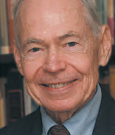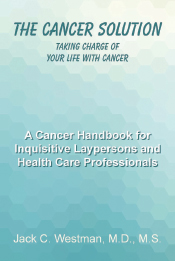Bookmark
Title: The Cancer Solution: Taking Charge of Your Life With Cancer
Author: Jack C. Westman, MD, MS
Publisher: Archway Publishing
Publication date: January 15, 2015
Price: $20.00; paperback, 310 pages
I was at a meeting in San Francisco in 1978 and received a call from my wife, Nancy: ‘Jack, I just came back from the doctor. He said I have a lump in my left breast.’” So begins The Cancer Solution, a new book by Jack C. Westman, MD, MS, Professor Emeritus of Psychiatry at the University of Wisconsin School of Medicine and Public Health, Madison. He has written more than 150 professional publications and 12 books.
The lump in his wife’s breast turned out to be an adenocarcinoma, and Nancy Westman had a radical mastectomy. She was a survivor for 26 years, and then, in 2002, the cancer recurred. After a valiant and very difficult struggle, she succumbed to the disease in 2012. That personal struggle and loss were the seed for this book. From the day that Dr. Westman’s wife was first diagnosed with breast cancer in 1978, he began doing extensive research on the disease and the various treatment options.
Naturally, oncology has gone through a huge transformation since 1978, and Dr. Westman’s knowledge and views have also evolved during that period. His idea to construct an informative book that offers material interesting to both the lay and medical communities comes with considerable challenges, many of which, unfortunately, he doesn’t overcome.
For starters, a reader of The ASCO Post opening the book will be confronted by rather loosely constructed data detailing the main categories of cancer and a cursory look at cancer staging. There’s a description of conventional treatments along with their various side effects. This common information won’t interest oncologists, and its plodding format will turn off lay readers, even those with cancer or those caring for someone with cancer. Moreover, this kind of cancer information is best delivered in pamphlets or on any of the numerous well-vetted websites.
Unwarranted Potshots
More problematic is the disoriented segue Dr. Westman takes halfway through chapter 1, skipping into Lance Armstrong’s battle with metastatic testicular cancer and then into an off-handed critique of conventional cancer treatment, focusing on cisplatin, which, despite considerable side effects, had cured Lance Armstrong. “Overall, [cisplatin proved] of little long-term value, except against testicular cancer, illustrating the fact that no single chemotherapeutic agent in use at this time kills all kinds of cancer cells.” This statement is not a news flash, and it simply serves as a lead-up to the rest of the chapter, which takes unwarranted potshots at the oncology community.
Dr. Westman makes some valid points about much-needed cost control, citing The New York Times article by Ezekiel Emanuel titled “A Plan to Fix Cancer Care.” However, he cannot resist the temptation to criticize the oncology community, stating, “The more doctors do for patients, the more reimbursement they receive.… Oncologists typically make more money if they use newly approved drugs and the latest radiation treatments than if they use cheaper, older alternatives that work just as well.” This is a broad and rather cheap accusation that community oncologists will surely find offensive. Moreover, there are no hard data to back it up.
The author then mentions ASCO’s Quality Oncology Practice Initiative (QOPI), giving a fairly good assessment of the project’s mission and goals. He also delivers a solid discussion about the impending oncology workforce shortage. But once again, Dr. Westman then veers erratically into a soft-toned diatribe about oncologists’ salaries, drilling home his bone of contention, writing, “Separating cancer specialists’ income from treatment choices is important.… Instead provider incentives should be aligned toward patient-centered, coordinated care among cancer specialists….”
It becomes glaringly obvious that Dr. Westman did not spend time in busy community clinics when researching his book. Nor did he venture into the interior of the ultra-introspective oncology community’s constant evolution toward patient-centered care, data collection, and patient communication. In these efforts, oncology serves as a model for most other medical disciplines.
Important Information
In the first half of chapter 3, “Navigating the Cancer,” Dr. Westman provides many simple-to-read instructions and hints for those newly entering the system, such as instructing patients how to track and maintain their own personal health record, offering suggestions and evaluations of several personal electronic health chart systems on the market. Readers are also given brief summaries about living wills, do-not-resuscitate orders, and other tough but vital decision-making guides. This is important information, especially for caregivers.
In the second half of the chapter, Dr. Westman gets down to the nuts and bolts of cost, another reliable source of information. But after a thorough trip through Medicaid tips to assessing the costs of nursing homes, Dr. Westman then wanders into thorny territory, advocating for “life panels,” which of course is a euphemism for the equally ridiculous term “death panels,” famously coined by Sarah Palin in 2009. As the oncology community knows, high-quality palliative care is needed for cancer patients facing end-of-life issues.
To make his argument for life panels, Dr. Westman uses a financial planner named Bob Goldman, who told the story of his elderly mother whose life had become “more punishment than reward.” Evidently, she wanted out.
In what amounts to a disjointed argument for physician-assisted suicide, Dr. Westman decries the costs of end-of-life care and seems to support Bob Goldman’s model for a life panel. He writes, “On a statutory life panel, a doctor would be held blameless. And Goldman would have no problem adding a medical ethicist and a therapist.”
Central Problem
The central problem with The Cancer Solution, aside from its misleading title, is that the author tries too hard to be too many things: instructor, policy wonk, historian, and all-around muckraking curmudgeon. Thus, the book’s good sections are muddled by the author’s strong opinions, which often come out of left field. Moreover, in pedantic fashion, the author assaults the reader with subtitled chapter sections such as “A Paradigm Shift is Needed” or “Models for Treatment Directed at Cancer Cells Themselves” and devotes a mere 80 or 90 words to these lofty goals. It feels rushed.
Dr. Westman saves the best writing for chapters 9, 10, and 11, during which he gives compelling descriptions of immunotherapy, lifestyle issues, prevention, and complementary strategies. He also makes a solid case for more focus on discovering the etiology of a cancer and then developing ways to prevent disease or treat it at its earliest stage, as seen with successes in gastric cancer and cervical cancer.
During these sections, although they are highly readable and interesting, Dr. Westman will certainly get challenged by his unwavering support of several eccentric researchers in the early 1900s who asserted, “the fundamental cause of cancer is a disturbance in cell metabolism that makes a cell prefer fermentation of glucose for energy production rather than the more efficient oxidative metabolism.… Therefore, it may be that the uncontrolled growth of cancer cells arises when they are stuck in the fermentation process.”
Dr. Westman concludes his book with a “Where Do We Go From Here?” chapter that doesn’t really add much in the way of new material on this subject. If he maintained the same tempo and interesting, if somewhat kooky, style and content as in his chapters on immunotherapy and complementary strategies, this would have been a better read. As it is, The Cancer Solution may not be for all readers of The ASCO Post. That said, Dr. Westman lost his wife to cancer, and wrote a book in her honor—a noble effort. ■



